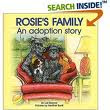
Openness in adoptions is a hot topic in the adoption world today. For those of you new to this topic, 'openness' refers to the level of contact an adoptive family has with the birth families. What I find interesting is the current trend in local adoptions is to be as open as possible. At least, it feels as though this is the case in the area we live. If your children were adopted locally, the assumption is that you have an open relationship with your child's birth family and visit with them regularly, or at least periodically. Phone numbers and addresses are exchanged so that biological relatives can contact the adoptive family whenever they like and vice versa.
This is the exact opposite of what happened 20-30 years ago. All adoptions were 'closed' adoptions, in which the adoptive families did not know the names, phones numbers or addresses of the birth parents. I can understand wanting to have some information and I can understand why some people like to build relationships with the biological parents of their child, who was adopted.
What bothers me is the 'assumption' that you will have an open relationship with the biological mother/father. Last I checked Canada, and the US were free countries, in which we value free choice. I don't like band wagons, I think they are dangerous.
The assumption that you will have an open relationship with the birth mother assumes that the birth mother will be a positive influence in your child's life.
That's an extra large assumption. Let's remember, there are many different reasons for a woman to make an adoption plan for a child. Sometimes it's situational, sometimes, it's because the woman knows she won't be a very good mother. She's a hero to then find the child a good home, and to acknowledge her shortcomings. But, she may not be respectful, or helpful or even considerate, everyone is different. You can't assume.
Let's take a minute to consider adoptive parents. People who can't biologically pro-create. People who are contributing citizens and will raise healthy, happy citizens who will contribute to society. I feel adoptive parents are under appreciated in today's adoptive world. Adoptive parents who think independently and don't follow trends are even less appreciated. "Why aren't you doing what everyone else does?" Is the impression I get when around social workers and other parents in the adoptive circle.
I think life in general, but adoption in particular is about choice, and about putting choice back into the hands of the little one who had no choice. What about the child who was adopted, do they get a choice in any of this? No contact with birth mother, as it was 20 years ago, made it difficult for those who wanted contact. Now the trend has flip flopped, so everyone should be open and create one big happy family. Who's making these decisions, certainly, not the child. Assumptions were made, about what is best. Assumptions.
What about stability? What about simplicity? What about families who are complicated enough without adding additional complications such as biological families? What about building a secure, loving family, with a strong sense of who you are within that family? What about personal choice?
What about letting your child grow in a family knowing he/she was adopted, and once she's old enough (9 or 10 yrs) to understand what adoption means, allowing her to choose if she wants contact with her biological parents? What about protecting your child from possible upset by careless comments from biological relatives, when you, as a parent has been so careful about choices in language, to ensure your child feels respected and special?
Isn't this your child's story? Is it ever safe to assume what anyone else wants? Isn't it always better to ask, especially when the topic is so important?
There's a saying, that says, "Never assume," for good reason.
I'm not saying being open in adoptions is bad. I just think that some prospective adoptive parents may be figuring out that there's a bit of a game when filling out the adoption application. If you say you're interested in an open adoption, you are more likely to be picked by a birth mother. Semi-open is also an option, but not as popular these days, in which you know the first name, not last name of the birth mother. You can communicate by letter through the adoption agency, but no phone numbers or addresses are exchanged. Of course, you need to be honest and have integrity and follow through with your application submission. Semi-open adoptions can give you time to get to know the biological mother and determine her stability and life philosophies, and whether or not she would be a positive influence in your child's life.
There are biological family members, that we are no longer in contact with, because they were mean spirited, and we were very concerned they would be disrespectful towards our daughters, because they were adopted. I feel children deserve that kind of protection. I will protect my children from any person who is a negative influence, whether the person is biologically related or not.
I respect my children's choices, I will not assume, I will ask what they want. This is their story, not mine. I will not let a social worker bully me into making assumptions. I stand against the trends, I protect my child's right choose.






